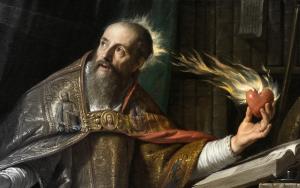
I love St. Augustine of Hippo. That might not seem like a big deal, but since at least the time of John H. Yoder, Augustine has been on the outs with the Anabaptist world, seen as the author of all that was wrong with Christendom. But I’m convinced that if we disregard Augustine we’re missing out on some of the richest theology and wisest spiritual guidance the church has to offer. There’s a reason most of the church for most of history has considered Augustine such a towering figure. Even Menno quoted him.
Anabaptists have sometimes painted Augustine (pronounced with a short “i” as: “August-in”) as the brains that followed Constantine’s brawn to dismantle the pacifist early church and replace it with a sacramental, hierarchical, patriarchal, imperial religion. There’s nothing for which Augustine can’t be blamed. This reading of history has its problems, not least that it fails to recognize that the early church was already deeply sacramental and hierarchical. Just read the letters of Ignatius of Antioch, who wrote shortly after the apostolic era on the road to his martyrdom. Ignatius understands the church sacramentally and hierarchically, speaking of the Eucharist as a sacrifice in his letter to the Romans and urging the Magnesians to “let the bishop preside in God’s place.” What’s more, post-Constantine the patristic church undermined patriarchy by honoring the role of women (think: Gregory of Nyssa and Macrina or Jerome and Marcella) and challenged imperialism (think: Ambrose of Milan barring Emperor Theodosius from receiving communion after the Massacre of Thessalonica).
It seems to me that we have mischaracterized Augustine. Not only that, but by not reading him, we’ve missed out on his profound insights. Here are a few I’ve discovered:
- Augustine develops a fresh take on human motivation. Augustine understood that who and what we love will shape how and why we live. Thus he wrote in a sermon on 1 John, “Love, and do what you will” and “Let the root of love be within, of this root can nothing spring but what is good.” (Homily 7 on the 1st Epistle of John). As James K.A. Smith puts it, drawing out the meaning of Augustine: “You are what you love” (You Are What You Love: The Spiritual Power of Habit, 2016). The task of a rich and fully-human life is learning to cultivate right loves, starting first with love of God and neighbor. All the rest follows.
- Augustine is frank about human sinfulness. We aren’t that good. Our motives aren’t that pure. We’re all a little like the apostle Paul, scarcely understanding what drives us, and sometimes doing the very thing we hate (Romans 7:15). That was Augustine’s experience, confirmed by his mother, Monica, who prayed her heart out in tears over her wayward son. Once, Augustine the preteen punk stole an armload of pears from his neighbor’s tree. Was he hungry? Did he need those pears? No. He didn’t even really want them. Augustine and his friends tossed the pears to some pigs. “I had no motive for my wickedness except wickedness itself. It was foul, and I loved it. I loved the self-destruction” (The Confessions iii.9). Alas. We’ve all been there.
- Augustine envisions followers of Jesus deploying power redemptively. Mennonites haven’t always held a robust theology of power. We’re skeptical of those who exercise power, and we sometimes refuse to acknowledge when we have power and wield it. Not Augustine. He envisions the possibility of humble rulers putting their power “at the service of God’s majesty” (City of God V.24). Even Augustine’s sketch of “just war theory” occurred in a personal letter to Boniface, a Christian governor longing to live out his faith with integrity while fulfilling his responsibilities of defense. Ultimately, Augustine grounded the Christian exercise of power, just as he grounded his teaching on the use of force, in Jesus’ command to love God and neighbor.
Augustine’s unique life experience contributed to his deep wisdom: he lived in a monastic community while serving as bishop of Hippo. Jesus was the center of his faith, and community was the center of his life. Augustine’s thought was forged by the call to Christian leadership and oriented by the Scriptures. He loved God and the church, which is no doubt one reason he’s often painted with his heart aflame.
One way Augustine poured out his burning-heart love of God was through his writing. And Augustine wrote a lot. If you’re going to start reading Augustine, I recommend picking up his Confessions, a work framed as a long prayer to his Lord.
In early 2019, our third son was born. I tell you this because of the middle name we gave him: “Augustine.” This baby has got some big shoes to fill!
Picture: By Philippe de Champaigne – Los Angeles County Museum of Art: online database: entry 171584, Public Domain, https://commons.wikimedia.org/w/index.php?curid=8481227












